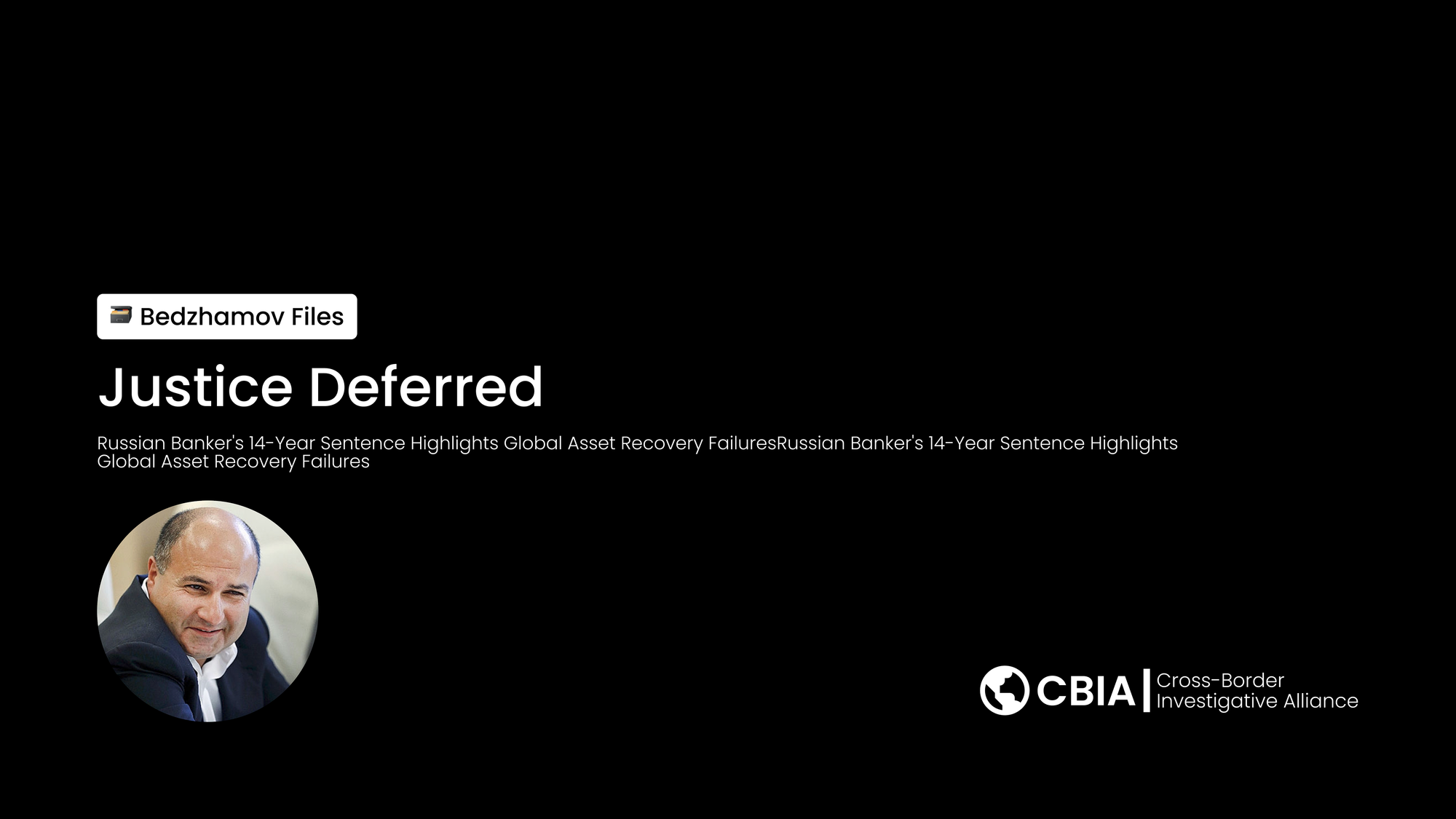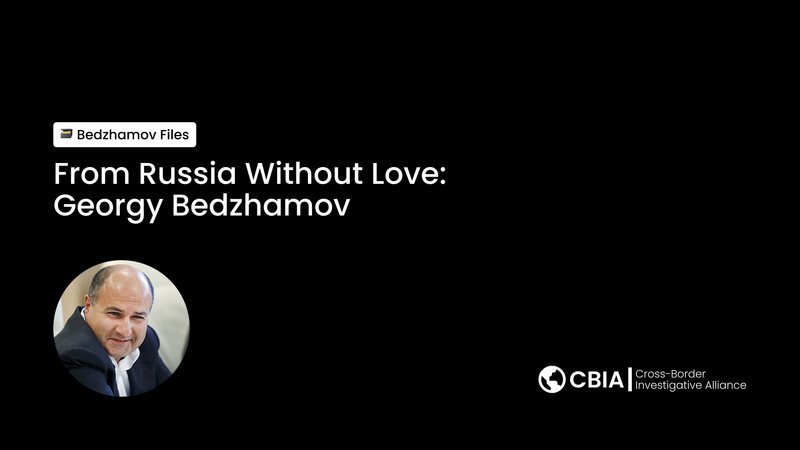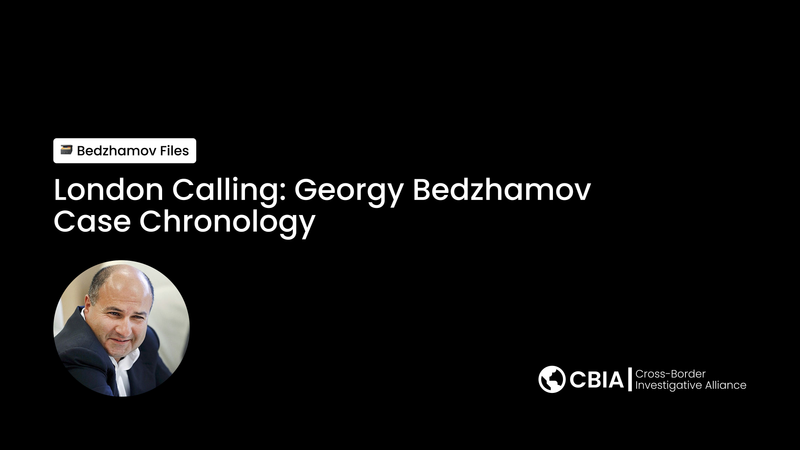Justice Deferred: Russian Banker's 14-Year Sentence Highlights Global Asset Recovery Failures
Moscow court convicts fugitive Georgy Bedzhamov in absentia for £1.2bn embezzlement as victims await compensation eight years after bank collapse
Exclusive investigation reveals how international jurisdictional gaps continue to shield billions in alleged fraud proceeds
A Moscow court has sentenced former Vneshprombank co-owner Georgy Bedzhamov to 14 years in prison for embezzling more than 156 billion rubles (£1.2 billion) from the collapsed Russian bank, marking the second conviction in absentia for the fugitive banker who has been living freely in London since 2016.
The Khamovnichesky District Court's December 2024 ruling, upheld again this year after an earlier conviction was overturned on appeal, represents the latest chapter in one of Russia's most significant banking fraud cases – yet Bedzhamov remains beyond the reach of Russian authorities, protected by complex international legal proceedings and jurisdictional barriers that have frustrated creditors and victims for nearly a decade.
The £2 Billion Heist
The case centers on the systematic looting of Vneshprombank, which served Russia's elite before its spectacular 2016 collapse left thousands of depositors without compensation. According to Russian prosecutors, Bedzhamov and his sister Larisa Markus, who served as the bank's president, orchestrated an elaborate criminal scheme beginning in April 2009.
Working alongside bank executives including vice-president Elena Glushakova and first vice-president Ali Odei Adzhin, the group allegedly issued non-repayable loans and diverted client deposits without authorization between April 2009 and December 2015. The total alleged theft exceeded 156 billion rubles, contributing to the bank's estimated £2 billion shortfall.
"From April 2009 to December 2015, Bedzhamov and group members provided non-repayable loans and wrote off money from bank client deposits without their knowledge," prosecutors stated in court documents reviewed by this investigation.
A Criminal Network Unraveled
The scale of the alleged conspiracy became clear as Russian courts processed cases against numerous co-conspirators. In January 2024, Moscow courts sentenced multiple defendants and ordered them to pay approximately 130 billion rubles in compensation to Vneshprombank.
Ali Odzhin received nine years imprisonment, while Maria Klyuevova, head of the bank's credit department, was sentenced to four and a half years. Three individuals involved in money laundering – Olga Mulina, Yevgeny Oras, and Genrikh Maloy – received sentences ranging from five to seven years.
Bedzhamov's sister Larisa Markus, initially sentenced to eight and a half years in 2017, saw her sentence extended to 13 years in January 2024. She has consistently denied guilt, but unlike her brother, remained in Russia to face justice.
Only Yekaterina Berlinova, found guilty of money laundering, received clemency with a three-year suspended sentence and amnesty.
London's Legal Labyrinth
While Russian courts pursued criminal convictions, a parallel battle raged in London's High Court over Bedzhamov's substantial UK assets. The centerpiece of this litigation is his £45 million Belgrave Square mansion, purchased in 2015 through a British Virgin Islands loan structure just months before the bank's collapse.
In 2019, London's High Court froze Bedzhamov's assets worth up to £1.34 billion as part of civil proceedings initiated by Russia's Deposit Insurance Agency (DIA) on behalf of Vneshprombank. The case has continued through multiple appeals and procedural battles, with significant rulings as recent as May 2024.
The London proceedings have been complicated by sanctions-related issues surrounding the litigation's funding. A UK judge ruled in May 2024 that there is "reasonable cause to suspect" that Russian litigation funder A1 LLC is owned or controlled by sanctioned individuals, yet allowed the funding arrangement to continue.
This ruling highlighted the £714 purchase price paid for A1 LLC's ownership transfer – a figure the court found suspiciously low and lacking clear commercial rationale, suggesting potential sanctions evasion through nominee arrangements.
Living in Luxury Amid Legal Battles
Despite the freezing orders, Bedzhamov has maintained a lavish lifestyle in London, initially receiving court approval for £240,000 monthly living expenses, later reduced through various legal disputes. The case has established important precedents for how UK courts assess "ordinary living expenses" for wealthy defendants subject to asset freezes.
Court documents reveal the extraordinary nature of Bedzhamov's permitted expenditures, which included maintenance of multiple international properties and substantial legal fees. In October 2022, a London court declared him bankrupt in the UK, yet he continues to contest asset recovery efforts.
The Human Cost
Behind the complex legal proceedings lies a human tragedy that often gets lost in technical disputes over jurisdiction and procedure. The collapse of Vneshprombank devastated thousands of depositors, with only approximately £240 million recovered by 2021 according to Russia's Deposit Insurance Agency.
Small businesses and pensioners who had trusted the bank with their life savings found themselves without recourse when accounts were frozen in January 2016. Despite Russian authorities' efforts to pursue criminal convictions and asset recovery, the vast majority of victims remain uncompensated nearly a decade later.
The case exemplifies how sophisticated international financial structures can be weaponized to shield stolen assets from recovery, leaving ordinary citizens bearing the ultimate cost while alleged perpetrators live comfortably abroad.
International Justice Gaps
Bedzhamov's case illuminates fundamental weaknesses in international cooperation on financial crimes. After fleeing Russia in December 2015, he was arrested in Monaco in April 2016 on a Russian extradition request. However, Monaco's Court of Appeal released him on bail, citing medical needs and humanitarian grounds, and ultimately denied extradition.
This decision occurred amid broader European concerns about Russia's historically low extradition success rate with Western countries – approximately 10% with the UK – often attributed to perceived political motivations behind Russian requests.
The case also highlights how conflicting legal systems can be exploited. While Russian criminal courts have secured multiple convictions and ordered substantial compensation, enforcement remains impossible without Bedzhamov's presence in Russian jurisdiction. Meanwhile, UK civil proceedings, though successful in freezing assets, face their own enforcement challenges and sanctions complications.
Regulatory Reforms and Ongoing Challenges
Legal experts point to the Bedzhamov case as exemplifying the need for stronger international cooperation frameworks and beneficial ownership transparency measures. The complex web of British Virgin Islands companies, Cyprus trusts, and Irish special purpose vehicles used in the alleged money laundering scheme continues to challenge investigators.
"This case demonstrates the sophisticated methods used to obscure beneficial ownership and move assets across multiple jurisdictions," said one legal source familiar with the proceedings, who spoke on condition of anonymity. "Without stronger international cooperation and transparency measures, such schemes will continue to frustrate justice."
As of 2024, Bedzhamov remains on Interpol's wanted list, with his 14-year sentence set to commence only upon his arrest and return to Russia – an outcome that appears increasingly unlikely given the current geopolitical climate and his established presence in the UK.
Looking Forward
The Bedzhamov saga continues to evolve, with ongoing Supreme Court proceedings in the UK and persistent asset recovery efforts by Russian authorities. The case serves as a stark reminder of the limitations of current international legal frameworks in addressing sophisticated financial crimes that span multiple jurisdictions.
For the thousands of Vneshprombank depositors still awaiting compensation, Bedzhamov's conviction in absentia offers little consolation. The sentence, while symbolically significant, does nothing to recover the billions allegedly stolen or provide justice for those whose lives were devastated by the bank's collapse.
As international authorities grapple with increasingly complex cross-border financial crimes, the Bedzhamov case stands as both a cautionary tale and a call for urgent reform of the systems that continue to enable such massive thefts to go unpunished.
This investigation is based on court documents from Russian and UK proceedings, official statements from regulatory bodies, and interviews with legal sources familiar with the case. Georgy Bedzhamov has consistently denied all charges and maintains they are politically motivated.
Key Sources:
- Forbes Russia investigative reporting
- UK High Court judgments and proceedings
- Russian Prosecutor General's Office statements
- Russia's Deposit Insurance Agency reports
- International legal database records




